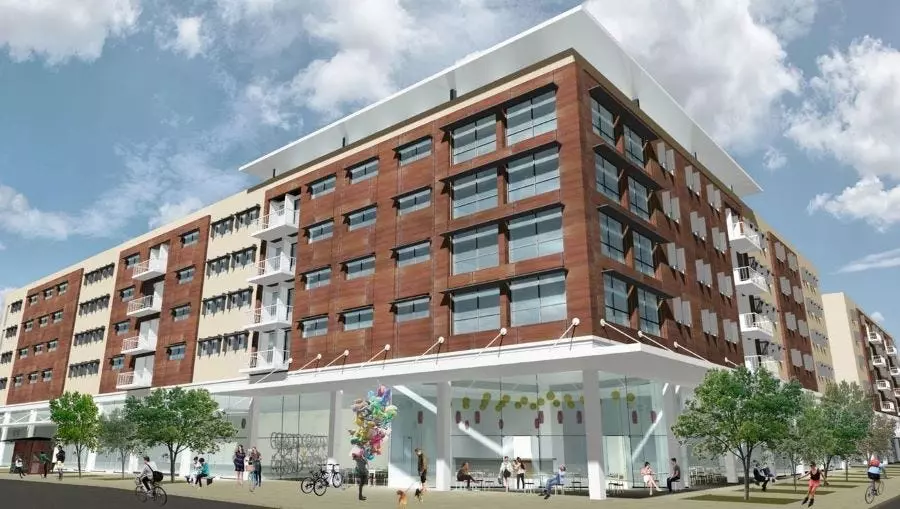 Conceptual art of Residences on Main, a 198-unit apartment development along Country Club Drive and Main Street in Mesa.
Conceptual art of Residences on Main, a 198-unit apartment development along Country Club Drive and Main Street in Mesa.
Over 20 years after Mesa attempted a land grab near an intersection of its downtown, a housing and retail project has now gotten underway.
Mesa’s downtown development has boomed over the past five years along its Main Street corridor, but a roughly 2-acre parcel on the corner of Country Club Drive has been left untouched.
That’s in part because of a failed city eminent domain case that forced the city to put a 10-year moratorium on any development at the site and also due to COVID-19 related setbacks.
Bailey vs. Mesa
In the 1990s, the city began condemning land at the Country Club Drive and Main Street intersection as an urban renewal effort to make way for an Ace Hardware store.
The Bailey’s Brake Services building stood on part of that land since 1974. Randy Bailey, who purchased the store from his father in 1995, pushed back against the city’s move to use eminent domain, the power that allows local governments to seize private property for public gain if they pay owners the fair market value.
Bailey sued the city saying its plans went outside of its power because the land would be used for a private, not public use.
In an editorial to The Republic, Bailey wrote, “This brake shop is my American Dream.”
The case went all the way up to the Arizona Court of Appeals and became the national poster child of government overreach. The court ordered Mesa to halt general development on the site for 10 years.
After the moratorium lifted, the city relaunched its efforts and this time it had Bailey on its side.
"It’s a totally different thing now," Bailey told The Republic in 2015. "It’s a developer looking to possibly develop this corner and negotiate with me on my property, and that’s the American way. It’s not the government jamming something down your throat."
Soon after, in 2016, the city selected Chicanos Por La Causa as a development partner for the location.
Jeff McVay, the city’s downtown transformation manager, said in hindsight the project now coming out of the ground will be a “signature development that is going to be a gateway to downtown” instead of a hardware store.
“This is a big deal for us to finally have resolution on the Bailey’s Brake site,” McVay added.
Residences on Main
The $90 million investment from Chicanos Por La Causa for Residences on Main is a part of the organization's mission to add to the housing units amid the state’s shortage, said Jose Martinez, executive vice president of economic development and real estate.
The 19,000 square feet of ground floor commercial space will house small local businesses, which the nonprofit is focused on uplifting, Martinez said. The apartments will be market rate that will be “attainable housing,” he said.
The project is expected to take nearly two years to wrap up. The city will reimburse Chicanos Por La Causa $100,000 for the replacement of the bus stop and streetlights.
Martinez said there is “incredible synergy” with their mission to have different levels of housing including, affordable, market rate and ownership opportunities.
The organization has a second project underway just down the street at the former Kiva Lodge Motel site along Main Street.
Mesa, a city that once faced challenges due to a failed land grab, is now witnessing the emergence of a $90 million development that will serve as the "gateway to downtown." This ambitious project, known as Residences on Main, is a collaborative effort between the city and Chicanos Por La Causa, aimed at revitalizing the area and addressing the shortage of housing units in the state.
The development, located at the intersection of Country Club Drive and Main Street, will encompass a five-story apartment complex consisting of 198 units and 19,000 square feet of commercial space. With an emphasis on supporting small local businesses, the ground floor of the development will provide a platform for these enterprises to thrive. Moreover, the apartments will offer attainable housing options, catering to the diverse needs of the community.
The journey to bring this project to fruition has not been without obstacles. Following a legal battle that reached the Arizona Court of Appeals, Mesa was required to halt development on the site for a decade. However, the city's determination and collaboration with Randy Bailey, the owner of Bailey's Brake Services, eventually paved the way for progress. Bailey, who initially opposed the city's eminent domain plans, recognized the value of the development and joined forces with the city.
Residences on Main is not only a testament to Mesa's commitment to economic growth but also a shining example of resilience and determination. The project is expected to take approximately two years to complete, with the city providing financial support for essential infrastructure upgrades.
As Mesa's downtown continues to transform, Residences on Main will undoubtedly serve as a cornerstone for future development. This exciting venture represents more than just buildings; it embodies the hopes, dreams, and aspirations of a community coming together to shape a brighter future.
 Conceptual art of Residences on Main, a 198-unit apartment development along Country Club Drive and Main Street in Mesa.
Conceptual art of Residences on Main, a 198-unit apartment development along Country Club Drive and Main Street in Mesa.

















